英语基础知识系列复习
- 格式:doc
- 大小:78.50 KB
- 文档页数:8
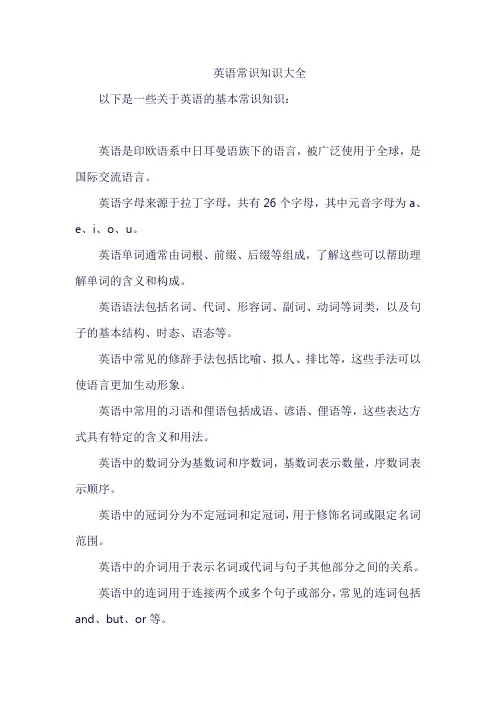
英语常识知识大全
以下是一些关于英语的基本常识知识:
英语是印欧语系中日耳曼语族下的语言,被广泛使用于全球,是国际交流语言。
英语字母来源于拉丁字母,共有26个字母,其中元音字母为a、e、i、o、u。
英语单词通常由词根、前缀、后缀等组成,了解这些可以帮助理解单词的含义和构成。
英语语法包括名词、代词、形容词、副词、动词等词类,以及句子的基本结构、时态、语态等。
英语中常见的修辞手法包括比喻、拟人、排比等,这些手法可以使语言更加生动形象。
英语中常用的习语和俚语包括成语、谚语、俚语等,这些表达方式具有特定的含义和用法。
英语中的数词分为基数词和序数词,基数词表示数量,序数词表示顺序。
英语中的冠词分为不定冠词和定冠词,用于修饰名词或限定名词范围。
英语中的介词用于表示名词或代词与句子其他部分之间的关系。
英语中的连词用于连接两个或多个句子或部分,常见的连词包括and、but、or等。
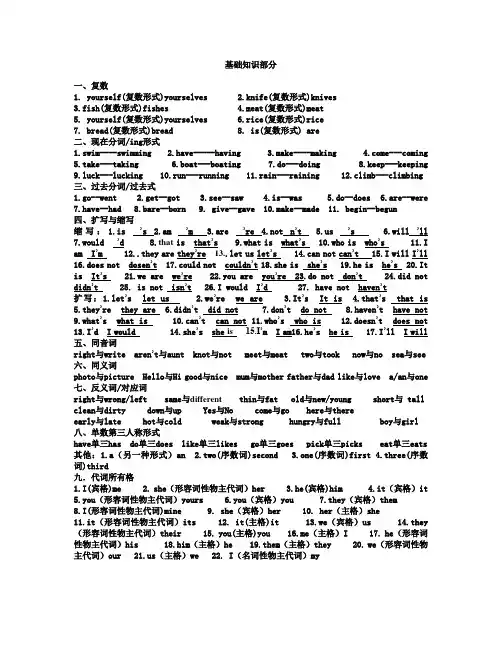
基础知识部分一、复数1. yourself(复数形式)yourselves2.knife(复数形式)knives3.fish(复数形式)fishes4.meat(复数形式)meat5. yourself(复数形式)yourselves6.rice(复数形式)rice7. bread(复数形式)bread 8. is(复数形式) are二、现在分词/ing形式1.swim----swimming2.have-----having3.make----makinge---coming5.take---taking6.boat---boating7.do---doing8.keep---keeping9.luck---lucking 10.run---running 11.rain---raining 12.climb---climbing三、过去分词/过去式1.go--went2.get--got3.see--saw4.is--was5.do--does6.are--were7.have--had 8.bare--born 9. give--gave 10.make--made 11. begin--begun四、扩写与缩写缩写:1.is ’s 2.am ’m 3.are ’re 4.not n’t ’s 6.will ’ll 7.would ’d8.that is that’s 9.what is what’s 10.who is who’s 11.Iam I’m 12..they are they’re 13..let us let’s 14.can not can’t 15.I will I’ll 16.does not dosen’t 17.could not couldn’t 18.she is she’s 19.he is he’s 20.Itis It’s 21.we are we’re 22.you are you’re 23.do not don’t 24.did notdidn’t 25. is not isn’t 26.I would I’d 27. have not haven’t扩写:1.let’s let us 2.we’re we are 3.It’s It is 4.that’s that is 5.they’re they are 6.didn’t did not 7.don’t do not 8.haven’t have not9.what’s what is 10.can’t can not 11.who’s who is 12.doesn’t does not13.I’d I would 14.she’s she is15.I’m I am16.he’s he is 17.I’ll I will五、同音词right与write aren’t与aunt knot与not meet与meat two与took now与no sea与see六、同义词photo与picture Hello与Hi good与nice mum与mother father与dad like与love a/an与one七、反义词/对应词right与wrong/left same与different thin与fat old与new/young short与 tallclean与dirty down与up Yes与No come与go here与thereearly与late hot与cold weak与strong hungry与full boy与girl八、单数第三人称形式have单三has do单三does like单三likes go单三goes pick单三picks eat单三eats其他:1.a(另一种形式)an 2.two(序数词)second 3.one(序数词)first 4.three(序数词)third九.代词所有格1.I(宾格)me2. she(形容词性物主代词)her3.he(宾格)him4.it(宾格)it5.you(形容词性物主代词)yours6.you(宾格)you7.they(宾格)them8.I(形容词性物主代词)mine 9. she(宾格)her 10. her(主格)she11.it(形容词性物主代词)its 12. it(主格)it 13.we(宾格)us 14.they(形容词性物主代词)their 15. you(主格)you 16.me(主格)I 17. he(形容词性物主代词)his 18.him(主格)he 19.them(主格)they 20. we(形容词性物主代词)our (主格)we 22. I(名词性物主代词)my练习题1.swim(-ing形式) swimming2.we(形容词性物主代词) our3.jump(现在分词)jumping4.his(宾格) him5.have(单三形式) has6.let`s(扩展形式) let us7.father(口语) dad 8.isn`t(扩展形式) is not9mum(书面语) mother 10.I am(不完全形式) I’m11.two(同音词) too 12.what is(缩写形式)what’s13. do not(缩写形式) don’t 14.right(同音词) write15.dosen`t(完全形式) dose not 16.me(主格) I17.去游泳(翻译) go swimming 18.they(宾格) them19.what time(翻译) 几点了20.we(形容词性物主代词) our21. No(反义词) Yes 22.What`s(完全形式) what is23.It is(缩写形式) It’s 24.I`m(完全形式) I am 25. doing(原型) do26.It`s time to(中文意思) 该是……的时间了。
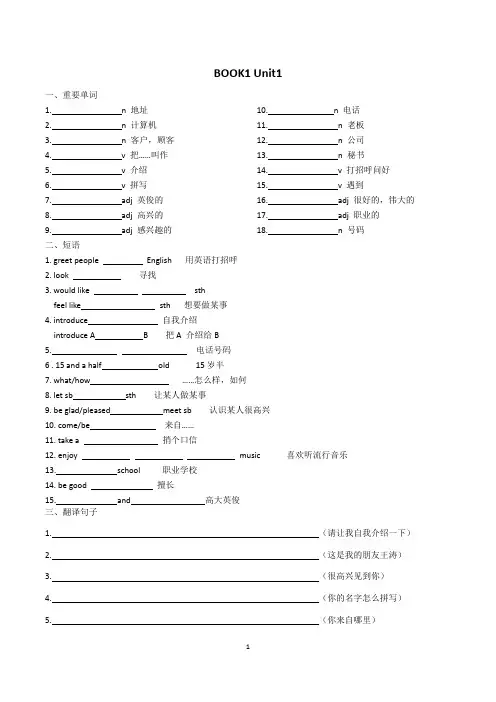
一、重要单词1. n 地址2. n 计算机3. n 客户,顾客4. v 把……叫作5. v 介绍6. v 拼写7. adj 英俊的8. adj 高兴的9. adj 感兴趣的10. n 电话11. n 老板12. n 公司13. n 秘书14. v 打招呼问好15. v 遇到16. adj 很好的,伟大的17. adj 职业的18. n 号码二、短语1. greet people English 用英语打招呼2. look 寻找3. would like sthfeel like sth 想要做某事4. introduce 自我介绍introduce A B 把A 介绍给B5. 电话号码6 . 15 and a half old 15岁半7. what/how ……怎么样,如何8. let sb sth 让某人做某事9. be glad/pleased meet sb 认识某人很高兴10. come/be 来自……11. take a 捎个口信12. enjoy music 喜欢听流行音乐13. school 职业学校14. be good 擅长15. and 高大英俊三、翻译句子1. (请让我自我介绍一下)2. (这是我的朋友王涛)3. (很高兴见到你)4. (你的名字怎么拼写)5. (你来自哪里)一、重要单词1. n 商业2. n 兼职工作3. n 全职工作4. n 流行音乐5. n (英)足球6. n 学科7. n 闲说,聊天8. v 上网9. v 学习,上课10. adj 令人厌烦的11. adj 感到厌倦的12. adj 不同的13. adj 困难的14. adj 最喜爱的15. adj 有趣的16. adj 空闲的二、短语1. one’s spare time 在业余时间2. classes 上课,听课3. class 下课后4. school 在学校5. life 日常生活6. be interested 对……感兴趣7. go 购物8. soccer 踢足球9. computer games 玩电脑游戏10. housework 做家务11. do some 做作业12. movie 电影明星13. do things 做不同的事14. teach 自学15. chat sb 与某人聊天16. travel sb 和某人一起旅游17. lunch 吃午饭18. home 回家19. be late school 上学迟到20. home 在家21. weekends 在周末22. notes 做笔记23. questions 讨论问题24. do a job 做兼职工作25. get 起床三、翻译句子1. (你平时在学校做什么)2. (你最喜欢的学科是什么)3. (我喜欢学校的生活)4. (你每星期有几节英语课)5. (你帮助你的妈妈做家务吗)BOOK1 Unit3 一、重要单词1. n 日历2. n 俱乐部3. n 日子,日期4. n 导游,向导5. n 领导6. n 经理7. n 成员,会员8. n 四分之一9. n 精神10. v 到达11. n 九月12. n 星期四13. v 结束14. v 加入15. v 离开,出发16. v 想念17. v 展示18. v 开始19. v 旅游20. adv 最终,终于21. adv 真正地22. n 八月二、短语1. a quarter five 五点一刻2.a quarter five四点四十五分3. a club 加入俱乐部4. money 挣钱5. look 看,注视6. out of 过时的7.It’s time sth到了做某事的时间了8. past eight八点半9. the meeting结束会议10. ask for 请假11.ask sb sth要求某人做某事12.show sb 领某人四处看看13.look forard 盼望;期待14.plan sth计划做某事15. a of …….中的一员16.have a with 和……进行比赛三、翻译句子1. (现在几点了?十点四五十分)2. (今天几号?九月15日)3. (几天星期几?今天星期五)4. (到我们吃午饭的时间了)5. (图书馆什么时候开门)一、重要单词1. n 度2. n 预报3. n 雪球4. n 温度5. n 雨伞6. n 天气7. v 形成8. v 移动9. v 滑冰10. n 春节11. adj 凉的12. adj 多云的13. adj 舒适的14. adj 有雾的15. adj 晴朗的16. adj 有风的17. adv 足够地18. v 下雨19. v 下雪20. v 滑雪21. adv 否则二、短语1. the same time 同时2. the dinner做饭3. noises出噪声4. weather 天气预报5. go (气温)上升6. go 滑冰7. Spring 春节8. summer 暑假9. the season 最好的季节10. stay home 呆在家里11. Thursday在周四12. neither hot cold 不冷不热13. put one’s raincoat穿上雨衣14. a snow大雪15. go (气温)下降16. go a picnic去野餐17. play snowball玩雪球18. fly 放风筝19. had better sth最好做某事20. run the rain在雨中跑三、翻译句子1. (今天天气怎么样)2. (你最好不要和狗玩)3. (气温下降的很快)4. (为什么不带把伞呢)5. (去滑雪怎么样)一、重要单词1. prep 在……对面2. adv 在前面,向前3. n 停车场4. n 教堂5. v 驾驶6. prep 紧靠着7. n 交通8. prep 在两者之间9. n 饭馆10. n 包裹11. adv 直地12. n 超市13. v 乘(车)选择14. v 下车16. prep 沿着17. adj 小心的二、短语1. car 停车场2. across the bank 在银行对面3. bus 乘公共汽车4. go straight 向前直走5. next 挨着,靠着6. the way 去……的路7. the left 在左边8. between 在……和……之间9. get 下车10.go the road沿着这条路走11. walk the street穿过马路12.go 前进,说吧,用吧,问吧13. traffic 交通灯14. 在前面(外部)15. 在前面(内部)16.the car park 最近的停车场17. left 向左转18.traffic 交通规则19.turn right the second turn在第二个转弯处向右拐三、翻译句子1. (请问最近的超市在哪里)2. (他们的房子就在我家对面)3. (沿这条路直走在交通灯处左拐)4. (你可以乘坐5路公交车)5. (日本在中国的东边)BOOK1 Unit6 一、重要单词1. n 饮食2. n 餐馆3. n 特色菜4. n 重量5. v 点菜6. n 饺子7. n 海鲜8. n 牛排9. n三明治10. n 账单11. adj 美味的12. adj 油炸的13. v 缺乏,不足14. v 尝起来15. adj 无味的16. adj 西方的二、短语1. taste 尝起来很美味2. the of the restaurant本餐馆的特色菜3. diet 健康饮食4.such 例如5.more and 越来越受欢迎6.talk about sth sb与某人谈话7.two of …两盘8.make sb 使……发胖9. 由于10. have idea不知道11. be 吃饱了12. be ready sth 准备(愿意)做13.be lack 缺乏14. how(what ) ……怎么样15. dumplings 包饺子16.the dumplings vegetables and meat素菜肉馅饺子17.lose 减肥18.in 健康状况不好19.order 命令某人做某事20.in 为了三、翻译句子1. (你喜欢牛排还是三明治)2. (你最喜欢的食物是什么)3. (你觉得饺子怎么样)4. (这儿的特色菜是什么)5. (想要喝点什么吗)一、重要单词1. n 劝告,建议2. n 发烧3. n 问题4. n 牙疼5. v 疼痛6. v 检查7. v 允许8. adj 眩晕9. adj 可怕的,很糟的10. adj 有毛病的11. n 咳嗽12. n 头疼13. n 药14. n 困难,麻烦15. v 建议,忠告16. v 伤害17. v 担心18. adj 严重的,严肃的19. adj 疲倦的20. 大量的,充足的二、短语1. a headache 头疼2.be away 远离3. 因为,由于4. sure 务必,确保5. 按时6. warm 取暖7. take it 放轻松8.worry 担心,担忧9. heathy保持健康10. the time总是,一直11. 顺便问一下12. a/the doctor看医生13.ask leave 请假14. be 小心做某事15. sb feel 让某人觉得16.It’s time do sth该做某事了17.lie/stay the bed卧床休息18. 建议做某事三、翻译句子1. (你怎么了)2. (我感冒了)3. (你应该好好休息一下)4. (多做运动保持健康)5. (你应该去看医生)一、重要单词1. n 能源2. n 荣幸,光荣3. n 聚会,派对4. n 同情,遗憾5. v 接受6. v 邮寄7. v 拒绝8. adv 准确地9. adj 有空的10. n 考试11. n 电影12. n 野餐13. n 出席,在场14. v 邀请15. v 准备16. v 想知道17. adj 出席的18. n 教授二、短语1.go a picnic 去野餐2. be present 出席,参加3. accept/refuse an接受/拒绝邀请4.have dinner sb 与某人共餐5.look forward 盼望某事6.New Yea r 新年联欢会7. 拒绝做某事8.be delighted 高兴做某事9. give sb 帮助某人10. have got a 头疼11.some time 其它时间12. 信用卡13.invite 邀请某人做某事14. 为了纪念15.prepare 准备做某事16. make 为……做准备17. 代替,而不是18.It’s no 毫无问题19.It’s 真遗憾……三、翻译句子1. (你想去野餐吗)2. (你什么时候有空)3. (你能帮我吗)4. (多么精彩的故事啊)5. (太可惜了,另外找时间吧)一、重要单词1. n 注意力,专心2. n 雾3. n 游戏4. v 道歉5. v 烹饪6. v 毕业7. v 原谅,宽恕8. n 访问者9. v 拿,抓,抱10. n 海滩11. n 足球12. n 访问者13. v 继续14. v 原谅15. v 采访16. adj 令人惊奇的17. adj 厚的二、短语1.go 购物2.cook sb 为某人做饭3.a day 一天的假4.apologize sb 向某人道歉5.be/become worried 对……担忧6. pay 注意7.leave 动身去某地8.pardon sb 因……而请求原谅9.call 拜访某人10. call 拜访某地11.be 被……覆盖12. the age of 在某人多大年龄时13. 整日整夜14.have 与某人交谈15. the beach 在海滩上16.no 不再17. the sea 在海边18.past 过去的事19.call sb 给某人会电话20.have time 玩得高兴三、翻译句子1. (上周末你做了什么)2. (请原谅我没有给你写信)3. (你昨天玩的好吗)4. (你为什么离开山东去新疆)5. (我为迟到向你道歉)一、重要单词1. n 圣诞节2. n 前夜3. n 节日4. n 鞭炮5. n 礼物6. n 假日7. n 项链8. n 小包9. n 亲戚10. v 庆祝11. v 装饰12. v 表达13. v 悬挂14. v 收到15. v 发送16. 中秋节17. v 度过18. adj 快乐的19. adj 传统的20. 春节二、短语1.plan 计划做某事2. 母亲节3. 父亲节4. 中秋节5. 春节6. home 在家7.express…sb 向某人表达8. fireworks放鞭炮9. 暑假10. 在圣诞节前夜11. 圣诞节快乐12. 悬挂,吊起13. 在火炉旁14. for 等待15. money 压岁钱16. 例如17. all 全世界18. the moon 赏月19. 做某事是个好主意三、翻译句子1. (节日你们都做什么)2. (春节是中国最重要的节日之一)3. (他给我寄来一张圣诞贺卡)4. (你要怎么度过寒假)5. (我花10元买了这本书)BOOK2 Unit1 一、重要单词1. n 外表2. n 出纳员3. n 梦想4. n 连衣裙5. n 高度6. n 夹克衫7. n 牛仔裤8. n 种类9. n 困扰,麻烦10. n 制服11. n重量12. v 进入,参加13. adj 卷曲的14. adj 勇敢的15. adj 有吸引力的16. adj 平均的17. adj 粗鲁的18. adj 苗条的19. adj职业的20. adj 随和的21. adj 友好的22. adj 滑稽的23. adj 灰色的24. adj 诚实的25. adj 有礼貌的26. adj 漂亮的27. adj 可爱的28. adj 幽默的二、短语1. 穿着……的衣服2. 对某人友好3. 与某人交朋友4. 给某人穿衣服5. 取笑6. 幽默感7. 以……而出名8. 以……为自豪9. 实现梦想10. 与某人谈论某事11. 一对……,一副…12. 最美丽的城市之一13. 中等高度14. 大约四十多岁15. 等待做某事16. 诚实地说17. 与……相似18. 在……年龄三、翻译句子1. (她很苗条)2. (她有着黑色的长发)3. (他穿着牛仔裤)4. (她长得怎么样)5.(你在这里大声说话是不太礼貌的)一、重要单词1. n 老者2. n 幸福3. n 知识4. n 看法5. n 富有6. n悲伤7. n 风格,风尚8. n 测试,试验9. n 村民10. v 克制。
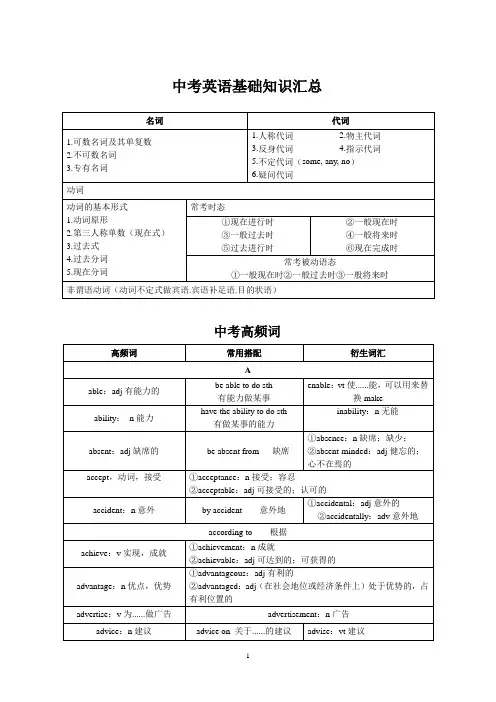
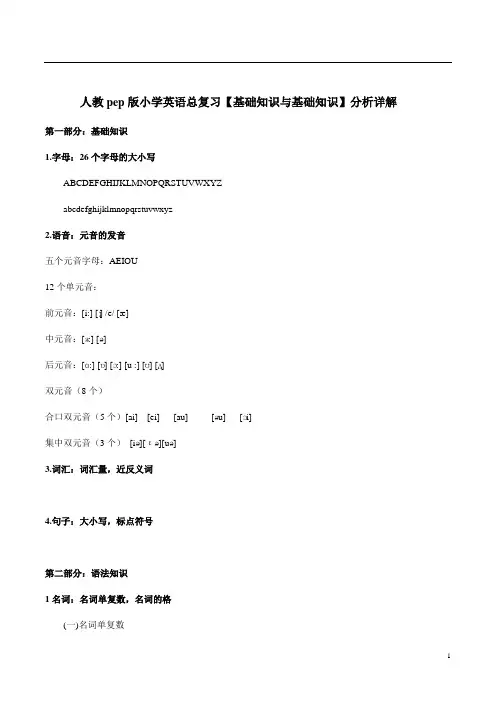
人教pep版小学英语总复习【基础知识与基础知识】分析详解第一部分:基础知识1.字母:26个字母的大小写ABCDEFGHIJKLMNOPQRSTUVWXYZabcdefghijklmnopqrstuvwxyz2.语音:元音的发音五个元音字母:AEIOU12个单元音:前元音:[i:] [ɪ] /e/ [æ]中元音:[ɜ:] [ə]后元音:[ɑ:] [ɒ] [ɔ:] [u :] [ʊ] [ʌ]双元音(8个)合口双元音(5个)[ai] [ei] [au] [əu] [ɔi]集中双元音(3个)[iə][εə][uə]3.词汇:词汇量,近反义词4.句子:大小写,标点符号第二部分:语法知识1名词:名词单复数,名词的格(一)名词单复数一般情况,直接加-s,如:book-books, bag-bags, cat-cats, bed-beds以s. x. sh. ch结尾,加-es,如:bus-buses, box-boxes, brush-brushes, watch-watches以“辅音字母+y”结尾,变y为i, 再加-es,如:family-families, strawberry-strawberries以“f或fe”结尾,变f或fe为v, 再加-es,如:knife-knives不规则名词复数:man-men, woman-women, policeman-policemen, policewoman-policewomen, mouse-micechild-children, foot-feet, tooth-teeth, fish-fish, people-people, Chinese-Chinese, Japanese-Japanese 不可数名词的复数就是原型:paper, juice, water, milk, rice, tea(二)名词的格有生命的东西的名词所有格:a) 单数后加’s 如: Lucy’s ruler my father’s shirtb) 以s 结尾的复数名词后加’如: his friends’bagsc) 不以s 结尾的复数后加’s children’s shoes并列名词中,如果把’s加在最后一个名词后,表示共有, 如:Tom and Mike’s car 汤姆和迈克共有的小汽车要表示所有物不是共有的,应分别在并列名词后加’sTom’s and Mike’s cars 汤姆和麦克各自的小汽车(2)表示无生命东西的名词通常用“of +名词”来表示所有关系:如:a picture of the classroom a map of China2冠词:不定冠词,定冠词种类(1)不定冠词:a / an a unit / an uncle元音开头的可数名词前用an :an egg / an apple / an orange / an eraser / an answer /an ID card / an alarm clock / an actor / an actress / an e-mail /an address / an event / an example / an opera /an houran old man / an interesting book / an exciting sport /an action movie / an art lesson /(2)定冠词:the the egg the plane定冠词的用法:特指某(些)人或某(些)物:The ruler is on the desk.复述上文提到的人或物:He has a sweater. The sweater is new.谈话双方都知道的人或物:The boys aren’t at school.在序数词前:John’s birthday is February the second.用于固定词组中:in the morning / afternoon / evening不用冠词的情况:专有名词前:China is a big country.名词前有定语:this , that , my , your , some, any , no 等:This is my baseball.复数名词表示一类人和事:Monkeys can’t swim. They are teachers.在节日,日期,月份,季节前:Today is Christmas Day. It’s Sunday.一日三餐前:We have breakfast at 6:30.球类棋类运动前:They often play football after class. He plays chess at home. * 但乐器前要用定冠词:I play the guitar very well.学科名称前:My favorite subject is music.在称呼或头衔的名词前:This is Mr Li.固定词组中:at noon at night by bus3代词、形容词、副词1).代词:人称代词,物主代词人称代词物主代词主格宾格第一人称单数I(我)memy(我的)复数we(我们)usour(我们的)第二人称单数you(你)youyour(你的)复数you(你们)youyour(你们的)第三人称单数he(他)himhis(他的)she(她)herher(她的)it(它)itits(它的)复数they(他们/她们/它们)themtheir(他们的/她们的/它们的)2).形容词,副词:比较级,最高级(一)、形容词的比较级1、形容词比较级在句子中的运用:两个事物或人的比较用比较级,比较级后面一般带有单词than。
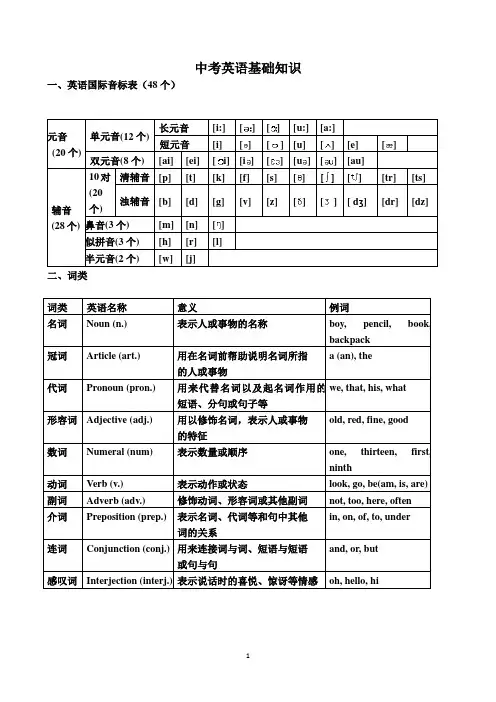
中考英语基础知识一、英语国际音标表(48个)][]]二、词类三、英语句子成分组成句子的各个部分即句子成分。
句子成分包括:主语、谓语、宾语、表语、定语、状语、补足语等。
一)、主语(subject): 句子说明的人或事物。
1.The sun rises in the east.太阳从东方升起。
(名词)2.He likes dancing.他喜欢跳舞。
(代词)3.Twenty years is a short time in history. 二十年在历史中是个很短的时间。
(数词)4.Seeing is believing.眼见为实。
(动名词)5.To see is to believe. 眼见为实。
(不定式)6.What he needs is a book. 他所需要的是本书(主语从句)二)、谓语(predicate): 说明主语的动作、状态和特征。
1.We study English. 我们学习英语2. He is asleep. 他睡着了。
三)、表语(predicative):表示主语“是什么”或者“怎么样”,表语前面的动词称为系动词。
1. He is a teacher.他是个老师(名词)2. Five and five is ten. 五加五等于十(数词)3.He is asleep.他睡着了(形容词)4.His father is in. 他的父亲在家(副词)5.The picture is on the wall. 画在墙上。
(介词短语)6.That sounds good 那听起来很好。
7.Tom looks thin. 汤姆看上去很瘦。
常见的系动词有: be, sound(听起来), look(看起来), feel(摸起来,smell(闻起来), taste(尝起来、吃起来), feel(感觉)...四)、宾语:动作、行为的对象1.I like China. 我喜欢中国。
(名词)2.You can help me. 你能帮助我。
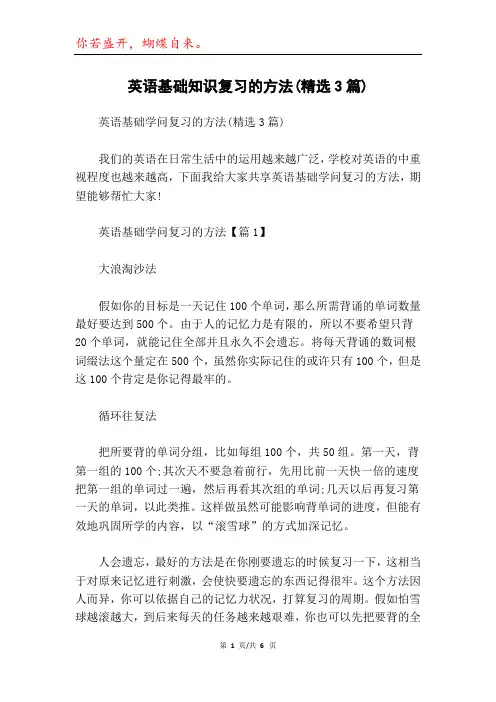
英语基础知识复习的方法(精选3篇) 英语基础学问复习的方法(精选3篇)我们的英语在日常生活中的运用越来越广泛,学校对英语的中重视程度也越来越高,下面我给大家共享英语基础学问复习的方法,期望能够帮忙大家!英语基础学问复习的方法【篇1】大浪淘沙法假如你的目标是一天记住100个单词,那么所需背诵的单词数量最好要达到500个。
由于人的记忆力是有限的,所以不要希望只背20个单词,就能记住全部并且永久不会遗忘。
将每天背诵的数词根词缀法这个量定在500个,虽然你实际记住的或许只有100个,但是这100个肯定是你记得最牢的。
循环往复法把所要背的单词分组,比如每组100个,共50组。
第一天,背第一组的100个;其次天不要急着前行,先用比前一天快一倍的速度把第一组的单词过一遍,然后再看其次组的单词;几天以后再复习第一天的单词,以此类推。
这样做虽然可能影响背单词的进度,但能有效地巩固所学的内容,以“滚雪球”的方式加深记忆。
人会遗忘,最好的方法是在你刚要遗忘的时候复习一下,这相当于对原来记忆进行刺激,会使快要遗忘的东西记得很牢。
这个方法因人而异,你可以依据自己的记忆力状况,打算复习的周期。
假如怕雪球越滚越大,到后来每天的任务越来越艰难,你也可以先把要背的全部单词都背一遍,实行每其次天只复习前一天的内容方法,等全部背完一遍后再从头来其次遍。
狂写法是依靠重复某种生理活动来强迫大脑认知的方法,对于大多数人来说是有效的。
当然每个人的习惯各有不同,有的喜好大声朗读所背单词,有的钟爱在白纸上边背边写所需记忆的单词,更有甚者把单词录成卡带,每日听之方可入眠。
真可谓“单词人人会背,各有奇妙不同”。
英语基础学问复习的方法【篇2】一、激发爱好。
提高力量九年级同学虽然有了好几年的英语学习经受,但不少同学仍旧死记硬背单词.有的是读不正确,有的是不会读,很难受单词关这样就严峻影响了复习效果。
“磨刀不误砍柴功”,在复习过程中.为了扫清障碍.应当抽出时间复习音标、拼读规章等语音学问.强化同学利用音标进行拼读,用拼读规章来帮忙记忆单词,提高同学自主学习单词的力量,应有意识地复习构词法,如合成法、转化法、派生法等,让同学举一反三,扩大词汇量。
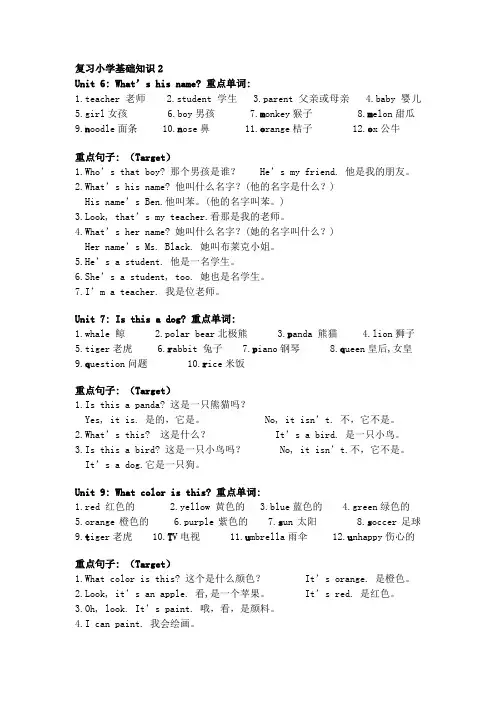
复习小学基础知识2Unit 6: What’s his name? 重点单词:1.teacher老师2.student学生3.parent父亲或母亲4.baby婴儿5.girl女孩6.boy男孩7.m onkey猴子8.m elon甜瓜9.n oodle面条 10.n ose鼻 11.o range桔子 12.o x公牛重点句子: (Target)1.Who’s that boy? 那个男孩是谁? He’s my friend. 他是我的朋友。
2.What’s his name? 他叫什么名字?(他的名字是什么?)His name’s Ben.他叫苯。
(他的名字叫苯。
)3.Look, that’s my teacher.看那是我的老师。
4.What’s her name? 她叫什么名字?(她的名字叫什么?)Her name’s Ms. Black. 她叫布莱克小姐。
5.He’s a student. 他是一名学生。
6.She’s a student, too. 她也是名学生。
7.I’m a teacher. 我是位老师。
Unit 7: Is this a dog? 重点单词:1.whale 鲸2.polar bear北极熊3.p anda 熊猫4.lion狮子5.tiger老虎6.r abbit 兔子7.p iano钢琴8.q ueen皇后,女皇9.q uestion问题 10.r ice米饭重点句子: (Target)1.Is this a panda? 这是一只熊猫吗?Yes, it is. 是的,它是。
No, it isn’t. 不,它不是。
2.What’s this? 这是什么? It’s a bird. 是一只小鸟。
3.Is this a bird? 这是一只小鸟吗? No, it isn’t.不,它不是。
It’s a dog.它是一只狗。
Unit 9: What color is this? 重点单词:1.red 红色的2.yellow 黄色的3.blue蓝色的4.green绿色的5.orange橙色的6.purple紫色的7.s un太阳8.s occer足球9.t iger老虎 10.T V电视 11.u mbrella雨伞 12.u nhappy伤心的重点句子: (Target)1.What color is this? 这个是什么颜色? It’s orange. 是橙色。
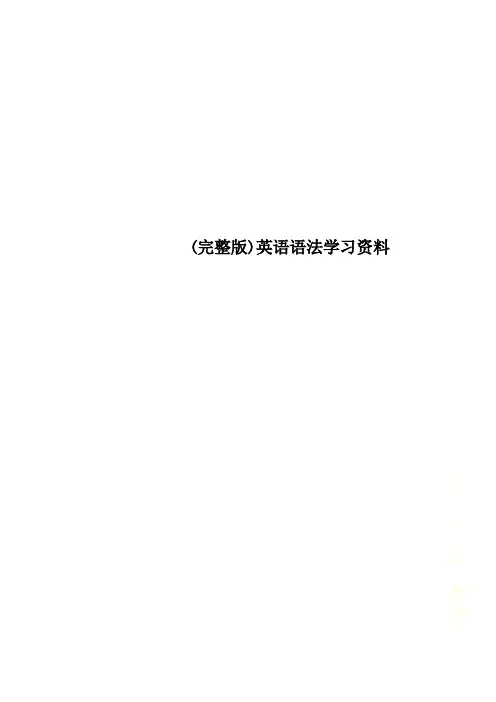
(完整版)英语语法学习资料英语语法学习资料(完整版) 第一讲名词⏹1.1名词的分类⏹名词可以分为专有名词(Proper Nouns)和普通名词 (Common Nouns),专有名词是某个(些)人,地方,机构等专有的名称,如Beijing,China等。
普通名词是一类人或东西或是一个抽象概念的名词,如:book,sadness等。
普通名词又可分为下面四类:1)个体名词(Individual Nouns):表示某类人或东西中的个体,如:gun。
2)集体名词(Collective Nouns):表示若干个个体组成的集合体,如:family。
3)物质名词(Material Nouns):表示无法分为个体的实物,如:air。
4)抽象名词(Abstract Nouns):表示动作、状态、品质、感情等抽象概念,如:work。
个体名词和集体名词可以用数目来计算,称为可数名词(Countable Nouns),物质名词和抽象名词一般无法用数目计算,称为不可数名词(Uncountable Nouns)。
归纳表格如下⏹ | |专有名词 | || 名 | | 个体名词 | | | | |------------| 可数名词|| | | 集体名词 | | | |普通名词 | | | | 词 | | 物质名词 | | | | |------------| 不可数名词|| | | 抽象名词 | |) 以y 1结尾的专有名词,或元音字母+y 结尾的名词变复数时,直接加s变复数:如:two Marys the Henrys monkey---monkeys holiday---holidays 比较:层楼:storey ---storeys story---stories2) 以o 结尾的名词,变复数时:a. 加s,如:photo---photos piano---pianosradio---radios zoo---zoos;b. 加es,如:potato--potatoes tomato--tomatoesc. 均可,如:zero---zeros / zeroes3) 以f或fe 结尾的名词变复数时:a. 加s,如:belief---beliefs roof---roofssafe---safes gulf---gulfs;b. 去f,fe 加ves,如:half---halvesknife---knives leaf---leaves wolf---wolveswife---wives life---lives thief---thieves;c. 均可,如:handkerchief:handkerchiefs / handkerchieves名词复数的不规则变化1)child---children foot---feet tooth---teethmouse---mice man---men woman---women注意:与 man 和 woman构成的合成词,其复数形式也是 -men 和-women。
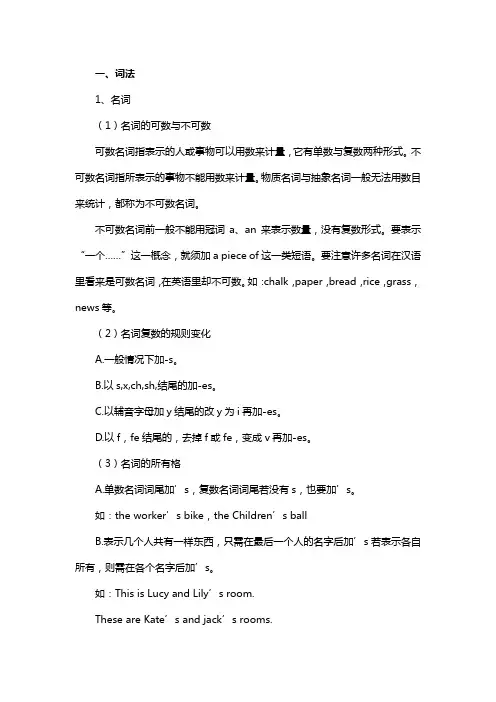
一、词法1、名词(1)名词的可数与不可数可数名词指表示的人或事物可以用数来计量,它有单数与复数两种形式。
不可数名词指所表示的事物不能用数来计量。
物质名词与抽象名词一般无法用数目来统计,都称为不可数名词。
不可数名词前一般不能用冠词a、an来表示数量,没有复数形式。
要表示“一个……”这一概念,就须加a piece of这一类短语。
要注意许多名词在汉语里看来是可数名词,在英语里却不可数。
如:chalk,paper,bread,rice,grass,news等。
(2)名词复数的规则变化A.一般情况下加-s。
B.以s,x,ch,sh,结尾的加-es。
C.以辅音字母加y结尾的改y为i再加-es。
D.以f,fe结尾的,去掉f或fe,变成v再加-es。
(3)名词的所有格A.单数名词词尾加’s,复数名词词尾若没有s,也要加’s。
如:the worker’s bike,the Children’s ballB.表示几个人共有一样东西,只需在最后一个人的名字后加’s若表示各自所有,则需在各个名字后加’s。
如:This is Lucy and Lily’s room.These are Kate’s and jack’s rooms.C.如果是通过在词尾加-s构成的复数形式的名词,只加’。
如:the students’books,the girls’blouses(另外:如果名词是有生命的,我们就用’s结构来表示所有关系。
如果名词所表示的事物是无生命的,我们就要用名词+of+名词的结构来表示所有关系。
)2、代词人称代词,物主代词,反身代词,指示代词,不定代词(1)人称代词第一人称单数I me my mine myself复数we us our ours ourselves第二人称单数you you your yours yourself复数you you your yours yourselves第三人称单数he him his his himselfshe her her hers herselfit it its its itself复数they them their theirs themselves(2)物主代词物主代词的用法:形容词性物主代词后面一定要跟一个名词;名词性物主代词可作主语、表语、宾语。
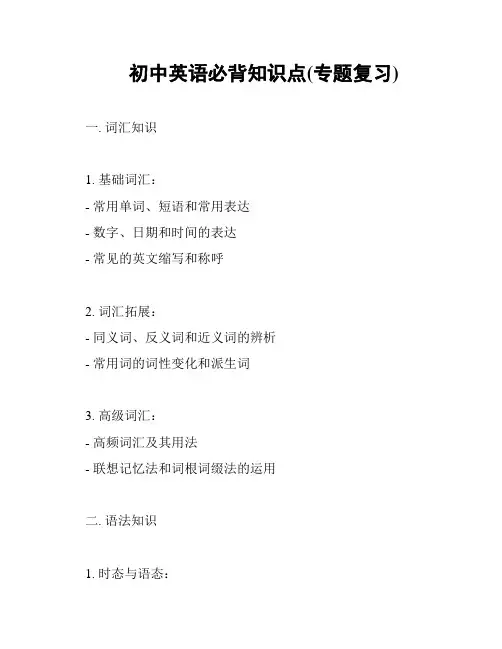
初中英语必背知识点(专题复习)
一. 词汇知识
1. 基础词汇:
- 常用单词、短语和常用表达
- 数字、日期和时间的表达
- 常见的英文缩写和称呼
2. 词汇拓展:
- 同义词、反义词和近义词的辨析
- 常用词的词性变化和派生词
3. 高级词汇:
- 高频词汇及其用法
- 联想记忆法和词根词缀法的运用
二. 语法知识
1. 时态与语态:
- 现在、过去和将来时的用法
- 被动语态的构成和应用
2. 句子结构:
- 主谓一致和主谓宾的搭配
- 并列句、复合句和简单句的转换
3. 修辞手法:
- 比喻、拟人和夸张的运用
- 省略、倒装和强调的使用
三. 阅读理解
1. 阅读技巧:
- 标题、目的和主题的推测
- 推理、推断和判断的训练
2. 阅读策略:
- 首句和细节的关键把握
- 上下文和语境的理解
四. 写作技巧
1. 作文要求:
- 书信、应用文和议论文的写作
- 开头、结尾和段落的构思
2. 写作方法:
- 归纳、列举和论证的技巧
- 表达清晰、连贯和正确的方法
以上是初中英语必背知识点的专题复,通过掌握这些知识,能够更好地应对英语考试,提高自己的语言水平。
(字数:xxx)。
英语基础知识大全_入门知识整理我们从小学就开始学习英语,然而很多人却仍学不好,所以英语基础知识扎实不扎实很重要,今天店铺在这里为大家分享英语基础知识大全,欢迎大家阅读!英语基础知识:冠词 a / an 的用法a用于辅音音素前a useful book, a university, a “u”Once a week have a swim/walk/talk/look/dance/drink/ rest have a cold/ headache / fever /cough have a good time have a try in a hurry after a while keep a diary go for a walk in a minute in a word in a short whilean则用于元音音素前an hour, an honest boy , an “A E F H I L M N O R S X”keep an eye on英语基础知识:定冠词the的用法1)特指双方都明白的人或物: Give me the book.2)上文提到过的人或事: ---Do you know the lady in blue? –Yes, she is a teacher of a university.3)指世上独一物二的事物the sun ( sky / moon/ earth/ world/ nature/ universe )4)单数名词连用表示一类事物,如:the dollar 美元; The lion isa wild animal.或与形容词或分词连用,表示一类人:the rich /poor/ blind/ aged / living / impossible5)用在序数词和形容词最高级,及形容词only,very, same等前面:I live on the second floor.6)用在表示身体部位的名词前: She caught me by the arm.7)用在表示乐器和表方位的名词之前:She plays the piano \violin \ guitar in the north of China8)用在普通名词构成专有名词前:the People's Republic of China the United States the Great Wall the Summer Palace9) 用在姓氏的复数名词之前,表示一家人:the Greens are playing the piano.10) in the day, in the morning (afternoon,evening),in the middle (of),in the end, all the time at the same time on the whole,by the way,go to the cinema at he age of six at the beginning of the twenty-first century on the other side of at the moment the day after tomorrow the day before yesterday,the next morning,in the sky (water,field,country)in the dark, in the rain,英语基础知识:不用定冠词的情况1) 国名,人名前通常不用定冠词:China , Europe 欧洲 Lei Feng 雷锋2)物质名词和抽象名词表示一般概念时,通常不加冠词;当表示特定的意思时,需要加定冠词Failure is the mother of success. 失败乃成功之母。
英语基础知识大全1. 语音基础1.1 语音发音英语中的语音发音包括元音和辅音。
元音是构成词语的音节的重要组成部分,辅音则是与元音搭配在一起形成单词的音素。
1.2 重音规则在英语中,重音在词汇中扮演着重要的角色,通常会影响单词的含义和语气。
1.3 音标音标是英语标准发音的符号表示法,通过音标可以准确地辅助学习者掌握英语发音规则。
2. 语法基础2.1 句子结构英语句子结构包括主语、谓语、宾语、表语等要素,了解句子结构能够帮助学习者正确构造句子。
2.2 时态英语中有多种时态,包括一般现在时、一般过去时、一般将来时等,掌握各种时态的用法是学习英语语法的基础。
2.3 语态被动语态在英语中是一种常见的语法结构,通过被动语态可以表达某些句子的客观情况。
3. 词汇基础3.1 单词拼写正确拼写单词是学习英语的基本功,通过拼写练习可以提高词汇的掌握程度。
3.2 词义搭配单词的词义搭配是学习者需要重点关注的问题,掌握常见单词的搭配能够帮助提高语言表达的准确性。
4. 阅读基础4.1 阅读技巧阅读是提高英语能力的重要途径之一,适当的阅读技巧可以帮助学习者更好地理解文章内容。
4.2 阅读理解通过阅读不同类型的文章,学习者可以提高自己的阅读理解能力,同时扩大词汇量和语言表达能力。
5. 写作基础5.1 写作结构英语写作需要遵循一定的结构规范,包括引言、正文和结论等部分,清晰的结构能够使文章内容更具条理性。
5.2 写作技巧写作技巧包括词汇的运用、句式的多样化、逻辑推理等,通过不断练习可以提高写作水平。
6. 口语基础6.1 口语练习通过与同学、老师或外国友人进行口语练习,可以提高英语口语表达能力,增加与外国人交流的信心。
6.2 发音训练通过持续的发音练习,可以帮助学习者更准确地发音,提高口语表达的流畅度。
以上是英语基础知识的概要介绍,希望能够帮助学习者系统地学习和掌握英语语言。
通过持续的练习和积累,相信每位学习者都能够取得进步,成为熟练的英语使用者。
英语基础知识复习资料专题一句子成分1.主语:动作的发出者,或:一个句子中的陈述对象。
He laughed.Swimming is interesting. 拓展: He laughs best who laughs last. Swimming is interesting. His words are true. What he said is true. 2.谓语:主语所发出的动作或具有的特征和状态。
He is lying on the ground. 拓展: He is crying now. I have seen the movie before.3.宾语:动作的对象或承受者或内容。
I love English. 拓展: I love him. I love dancing. I want to see you.I believe your words. I believe what you said. 4.宾补:补充、说明宾语的成分。
He gradually found English interesting. We all choose him monitor. 拓展:He gradually found English interesting. We all choose him monitor. The hotel makes me at ease. The teacher told me to leave at once. Can you see the girl dancing over there I saw the boy taken to the office. 1 怎么辨别“主—谓—宾—宾”和“主—谓—宾—宾补”?宾语和宾补之间其实是主谓关系。
He calls me uncle.[→I am his uncle] I saw him taken away.[→He was takenaway.] I found him in the room.[→He was in the room.] 而两个宾语之间不存在主谓关系: He gave me a book.[不能理解为:*I am a book.] 5.表语:说明主语的身份、特征、状态的成分,位于系动词后面。
英语基础知识大全归纳总结
英语基础知识大全:
一、语音知识
1. 音标:英语中共有48个音标,包括元音和辅音。
2. 音节:一个单词的发音单位,由一个或多个元音和辅音组成。
3. 连读:两个或多个单词连在一起读,例如“I am”读作“I’m”。
4. 语调:句子中声音的高低起伏,用于表达不同的情感和语气。
二、词汇知识
1. 词性:名词、动词、形容词、副词、介词等。
2. 词义:单词所表达的意义,包括同义词、反义词、一词多义等。
3. 词根和词缀:用于构成新单词的词根和词缀,例如“un-”表示否定。
4. 固定搭配:某些单词在一起使用的固定搭配,例如“make sb. do sth.”等。
三、语法知识
1. 时态:表示动作发生的时间和状态,包括现在时、过去时、将来时等。
2. 语态:动作与主语的关系,分为被动语态和主动语态。
3. 虚拟语气:表示与实际情况相反或不可能实现的愿望和假设。
4. 非谓语动词:动词的非谓语形式,包括不定式、分词和动名词。
5. 主谓一致:主语与谓语在人称和数上保持一致。
6. 句子结构:简单句、复合句和并列句等。
7. 从句:句子中的从属成分,包括名词性从句、定语从句和状语从句等。
四、写作知识
1. 写作技巧:包括构思、选词、造句、段落安排等。
2. 写作风格:个人写作风格的表现,如简洁明了、生动形象等。
3. 写作规范:包括标点符号的使用、拼写和语法规范等。
4. 写作类型:不同类型的写作要求不同,如说明文、议论文、记叙文等。
英语必备的基础知识英语是一门全球通行的重要语言,在当今社会中具有重要的地位。
掌握英语基础知识是学习英语的第一步。
本文将介绍英语学习过程中不可或缺的基础知识,帮助读者打下坚实的语言学习基础。
一、英语的字母表英语字母表共包含26个字母,分别为A-Z。
熟练掌握英文字母的读音和书写是学习英语的基础。
除了单独的字母外,英语中还有元音字母和辅音字母的概念,需要了解其发音规则。
二、英语的基本语法英语语法是英语学习的关键,包括句子结构、主谓宾语的搭配、时态等。
其中,动词的时态、语态、语气等概念需要掌握清楚,以确保句子表达的准确性和流畅性。
三、英语的常用词汇词汇是语言表达的基本单位,掌握常用的英语词汇对于日常交流和学习都至关重要。
积累词汇量、了解词义和词性是提高英语表达能力的关键步骤。
四、英语的基本句型英语句型种类繁多,常见有陈述句、疑问句、感叹句等。
了解不同句型的构成和使用规则,有助于扩展表达能力,提高语言交流效果。
五、英语的常见语言现象在学习英语过程中,会遇到一些常见的语言现象,如缩略语、短语动词、习惯用语等。
了解这些语言现象可以更好地理解和运用英语,丰富语言表达方式。
六、英语学习的方法与技巧除了掌握英语的基础知识外,还需要了解有效的学习方法与技巧。
例如,多听、多说、多读、多写是提高英语水平的常用方法,同时注意语言输入和输出的平衡。
结语掌握英语的基础知识是学习英语的基础,对于日常生活和工作都具有重要意义。
通过不断学习和实践,逐步提升英语水平,让英语成为我们的得力工具和交流桥梁。
以上是英语必备的基础知识的介绍,希望对英语学习者有所帮助。
学习英语虽然需要时间和耐心,但只要坚持不懈,一定能取得进步。
加油!。
英语基础知识系列复习第一讲冠词1.掌握冠词的基本用法2.掌握冠词的固定搭配3.掌握抽象n.具体化的现象4.掌握表示类别的方法Ⅰ不定冠词的使用场合1.a+辅音字母开头的单词(指发音)an+元音字母开头的单词(指发音)eg. a unit 一个单元∕单位an egg an x-raya useful book an hour an honoura university student an honest boya European a one-eyed monkey2.说话双方只要有一方心里不清楚或不知道的人或事物n.之前用不定冠词,表泛指eg. A Mr.Smith wants to see you .比较: Mr.Smith wants to see you .(说话者均认识Mr.Smith)eg. —Hello,could I speak to Mr.Smith?--Sorry,wrong number.There isn’t ____ Mr.Smith here.A.不填B.aC.theD.one (强调数量) Beg. --Have you seen _____pen ? I left it here this morning.--Is it _____black one ?I think I saw it somewhere .A.a,theB.the,theC.a,a C3.不定冠词在意义上相当于every或per(表示每一个),用于价格,时间,速度,比率等表达式中。
eg.They cost 50 pence (便士)a kilo(公斤)。
I can tape 50 words a minate.He was driving at 50 miles an hour .4. a most…:一个非常、极其… ;the mo st …最(高级)eg. a most(=very) interesting bookSoccer is a most popular game.eg. Hangzhou is _____most beautiful sity, where you can see ____famous West Lake. A.a,the B.a,/ C.the,a Aeg.This is the most interesting novel I have ever read.5.不定冠词与序数词连用a second/third 再一……又一……the first /second……last 第几若干个eg.You may try a second time if you fail .He is always the first to come to school .(序数词后接动词不定式作宾语) eg. The cakes are del iciours .He’d like to have __a___ third one ……6.表职业eg.I am a teacher.eg.When he left college ,he got a job as __a__repoter in a mewspaper office.eg.He turned thief ,which made his parents very sad .(系动词turn作“变…,成为……”讲时,后接不加冠词的任何单数名次。
)7.(be)of a/an +单数名词:属于同一的既可作表语,又可作后置定语eg. We’re of an age.我们同岁。
eg. Birds of a father flock together .物以类聚=Things __of_a_kind__come together.8. so/how/as/too/no+adj.+a(n)+单n.eg:This is so tall building that we can see the whole city when we stand on the top of it.eg. How clever a boy he is !eg. Tom is as clever a boy as Jack.eg. This is too small box to hold all these things.eg. This is no more interesting a film than that one .This film is no more interesting than that one .9. 首次提到的可数单数名词前用a,再次提到用“the”eg.He lent me a book yesterday.The book is not interesting at all.eg.I was born in a small village and great changes have taken place in the village in the last few years.10.短语(不定冠词)as a result all of a sudden 突然as a matter of fact as a rule一贯as a whole in a word 总之get in a word 插话once upon a time 从前have a good time 玩得开心have a word with 与某人交谈 a wast of 对…的浪费(常作表语)at a time 每一次(若干个)at one time 曾经(一段时间)at a distance 隔开一些(距离)from a distance 从远方,从远处in a hurry匆匆忙忙的in a way 在某种意义上in a temper 生气地once in a while 偶尔have a pain 疼痛do sb. a favour have a try 试一试make a living 谋生take a chance 冒险keep an eye on 照看… take an interesting in 对什么感兴趣on a large scale大规模的keep sth a secret 对……保密Ⅱ定冠词的使用场合1.当某一n。
被介词短语或定从限制时,表示特指用“the”eg.The shoes under the bad are mine.The factory which you visited a few days ago caught fire last night.2.表示说话双方心里都清楚的人或事物n.前用“the”eg.Open the window,please.I’m going to the supermarket this after noon .---Where’s Jack ?---I think he’s still in _不填_bed,but he might just be in _the__bathroom.3.用于世界上独一无二的事物n.前the sun/ moon /earth /world/ sky /star / universe /sea / atmosphere/ globe/ equator (赤道)eg.a bright moon /star a peacefull wordeg.Wouldn’t it be _a_ wonderfull word if all nations(国家)lived in _不_peace with one antother?It is _a_ world of wonders ,_a_ world where anything can happen.创造奇迹:work wonders4.用于方位n.前the east (west /north/south/right /left)A.in the east of ……(在某一范围内)在……东部eg.Japan lies in the east of Asia .What’s it like working in the south of China ?B.on the east of ……(两地相连)在……东边eg.Hebei province is on the east of Shanxi province.C. (to the )east of ……(不在同一区域内)在……以东eg.TaiWan is to the east of Fujian province.D. at/on the right /left(在右边/左边)eg.He is sitting on my left.F. turn/look/walk to the left /right表示方位的n.前有时可作advThe swallows(燕子)go south in the winter .Turn (to the )left ,and you can see a post office .题:At noon ,we reached _a_ small village__(to the)或不填__east of the town.Summer in _the_South of France are for the most part dry and summy. 5.用于表示自然现象的n.前the wind/rain/smow /storm the weather/climate注:a heavry rain a strong wind6.用于表示某一类人的adj或分词前,表示这一类人的通称The poor /rich/sick(病人)/living/dead/young……7.表乐器n.前to play the violin /piano/guitar8.表示娱乐场所的名词前to go to the cinema/theatre/concert/evening party9.用于彪发明物之前eg.The compass was invented by the Chinese.10.用于序数词及adj的最高级前eg.---Who came out _不填_first in the London Marathon?注:come out firsr (比赛或考试中)获得第一名11.表示姓氏的复数n.前,表示“……一家人,……夫妇”eg.The Greens is/are going to China next month.The Wangs quarreled with the Zhangs yestearday.12.用于表示“……国人”的n前,表示该国人的统称.eg.The Chinese 中国人The English 英国人13.用于表示计算单位的名词前by the hour 按小时计算by the dozenby the day 按天计算注:by weight 按重量计算by volume 按体积计算Eg.Cleaning women in big cities usually get paid by the hour.These eggs are sold by the dozen .Spring is the best season of the year.Apples are usually sold by _不_weight and eggs are sometimes sold by the dozen14.用于世纪、年代的名词前eg: in the 90’s /90s 读作:in the ninetinesin the 1990’s /1990s 读作: in the nineteen ninetieseg: in the nineties of the twentieth century (在20世纪90年代)eg: Paper money was in _/_ use in China when Marco Polo visited the country in _the_ thirteen country.15.用于“the + 比较级+ of the two …”,表示“两者之中较……的一个”eg:He is the older of the two boys.If the manger had to cloose between the two ,he would say John was_the better_ choice.16.用于“the + 比较级……,the + 比较级……”句型中表示“越……,越……”eg: the sooner the betterThe more learned he is ,the more modest he is .The hander you study ,the greater progress you will make .第一个“the+比较级”表条件,后面的句子用一般现在时表将来。